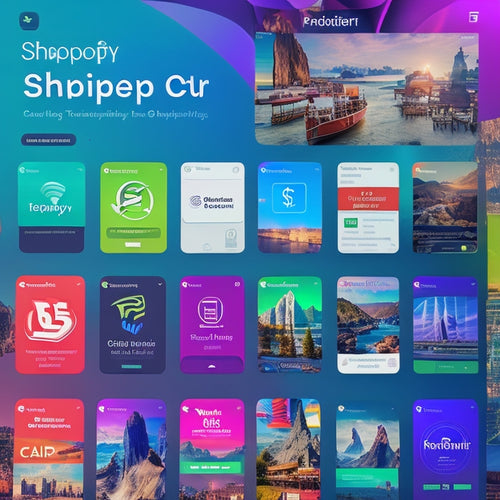
Create and Sell Online Courses for Ecommerce Success
Share
You've spent years perfecting your ecommerce skills, and now it's time to monetize that expertise by creating an online course. To start, identify your unique strengths and the niche you excel in. Then, craft engaging content that resonates with your target audience, using storytelling, visuals, and interactive elements. Next, choose the right platform for your course, considering factors like pricing, scalability, and customization. With your course built, develop a solid marketing plan to reach your audience, and be prepared to scale and maintain your course as it grows. Now, take the first step towards sharing your ecommerce expertise with the world.
Key Takeaways
• Identify your unique ecommerce expertise and create targeted course content that resonates with your audience.
• Craft engaging course content using storytelling, visual demonstrations, and interactive elements to educate and motivate students.
• Choose the right platform for your course, considering pricing, scalability, features, and customization options that reflect your brand.
• Develop a solid marketing plan, including email marketing, social media advertising, and influencer partnerships to reach your target audience.
• Ensure course scalability and maintenance by prioritizing updates, feedback loops, and customer engagement to drive revenue and relevance.
Identifying Your Unique Expertise
To create a successful online course, you need to tap into your unique expertise, that special something that sets you apart from others in the ecommerce space and makes your knowledge valuable to potential students. This is where niche selection comes in - identifying a specific area within ecommerce where you excel and can offer unique insights.
By doing so, you'll be able to create content that resonates with your target audience and establishes your authority in the field.
Before diving into content creation, take a step back and conduct a skills assessment. What're your strengths and weaknesses? What areas do you need to improve on? Be honest with yourself, as this will help you create a course that's authentic and valuable.
Additionally, conduct market research to understand what your potential students are looking for and what's currently missing in the market. This will help you tailor your course to meet their needs and stand out from the competition.
Crafting Compelling Course Content
Now that you've identified your unique expertise and conducted market research, it's time to translate your knowledge into engaging, informative, and well-structured course content that resonates with your target audience. Your goal is to create content that educates, motivates, and inspires your students to take action. To do this, you'll need to craft a narrative that's both informative and entertaining.
Here are some strategies to help you create compelling course content:
-
Use engaging storytelling:
Share personal anecdotes, case studies, or client success stories to illustrate key concepts and make your content more relatable. -
Incorporate visual demonstrations:
Use screenshots, videos, or animations to show students how to apply your teachings in a practical way. -
Break down complex topics:
Divide complex subjects into bite-sized modules or lessons that are easy to digest.
-
Make it interactive:
Include quizzes, exercises, or discussion prompts to keep students engaged and motivated.
Choosing the Right Platform Tools
You've crafted compelling course content, and now it's time to bring it to life by selecting the appropriate platform tools that will assist you in delivering an exceptional learning experience to your students. With so many options available, comparing platforms is crucial, taking into account factors such as pricing, scalability, and features.
You'll want to assess the advantages and disadvantages of popular platforms like Udemy, Teachable, and Kajabi, considering which one aligns best with your goals and budget.
When selecting a platform, consider the user experience you aim to create for your students. Do you prefer a tailored website that reflects your brand, or a more straightforward, no-frills approach? Think about the level of customization you require, as well as the ease of use for both you and your students.
Moreover, seek platforms that provide comprehensive analytics and reporting, enabling you to monitor student progress and make informed decisions based on data. By choosing the appropriate platform tools, you can concentrate on what's most important – delivering high-quality content and aiding your students' success.
Marketing Strategies for Success
How will you reach your target audience and convince them that your course is the key to accessing their ecommerce success? This is where marketing strategies come in.
You've created an amazing course, but it's worthless if no one knows about it. To get the word out, you'll need a solid marketing plan.
Here are some strategies to get you started:
-
Email marketing: Build an email list of potential customers and send them targeted campaigns showcasing the benefits of your course.
-
Social media advertising: Use platforms like Facebook, Instagram, and LinkedIn to reach your target audience and drive traffic to your course sales page.
-
Influencer partnerships: Partner with influencers in the ecommerce space to promote your course to their followers.
- Content marketing: Create valuable content such as blog posts, videos, and podcasts that showcase your expertise and drive traffic to your course.
Scaling and Maintaining Courses
As you've successfully launched your course, the next challenge lies in scaling and maintaining its momentum, guaranteeing consistent revenue streams and continued relevance in the competitive ecommerce landscape. To achieve this, you'll need to prioritize course updates, focusing on refining and expanding your content to meet the evolving needs of your students.
Scalability is key, so make sure your course infrastructure can handle increased traffic and enrollments.
Customer engagement is vital in maintaining momentum. Establish feedback loops to collect insights from students, identifying areas for improvement and opportunities to innovate. This won't only enhance the learning experience but also foster a loyal community that will drive word-of-mouth marketing and encourage repeat business.
Frequently Asked Questions
How Do I Protect My Course Content From Being Stolen or Copied?
'To safeguard your valuable content, you'll want to prioritize copyright protection and content security, implementing measures to prevent plagiarism and guarantee digital rights, such as watermarks, encryption, and licensing agreements, to protect your intellectual property.'
Can I Sell My Course on Multiple Platforms Simultaneously?
You can definitely sell your course on multiple platforms simultaneously, but be cautious of platform exclusivity clauses. Guarantee brand consistency across all platforms to maintain your professional image and maximize sales.
Do I Need to Provide Customer Support for My Course Students?
"When you're the guru, you'll need to set boundaries and prioritize communication to avoid being overwhelmed by student queries, while building a community that fosters engagement and encourages students to support each other."
How Do I Handle Refunds and Course Cancellations?
You'll want to establish clear refund policies, communicating them upfront to avoid disputes, while also protecting yourself legally from plagiarism claims and ensuring seamless cancellations that maintain your professional reputation.
Can I Update My Course Content After It's Already Been Published?
"Fasten your seatbelts, flux capacitor engaged! You can definitely update your course content after publishing, and you should - it's a great way to incorporate feedback, make improvements, and add fresh insights, ultimately enhancing the learner's experience and boosting your credibility."
Related Posts
-

Ultimate Guide to Shopify SEO: Boost Your Store's Ranking in 2022
This article serves as an ultimate guide to Shopify SEO, offering insights and strategies for Shopify store owners t...
-

Optimize Your Shopify Store With Automated Tagging
This article explores the optimization of Shopify stores through the implementation of automated tagging. Shopify ta...
-

Unlocking Revenue Potential: Join the Shopify App Store Revenue Share Plan
The Shopify App Store has implemented a new revenue share plan for its partners, aimed at unlocking their revenue po...


